新实用大学英语第一册第一单元
新实用英语读写译教程(第1册)最新版教学课件Unit 1 Text A

Stop the subject and change another one.
UNIT ONE
< Back
Next >
Text A
You should also be prepared to answer questions in a conversation. For example, if you are a student, be prepared to talk briefly and generally about your major, your classes, and your future plans. In addition, it is helpful to keep up with current events—what is going on in your school, your local area, the country, and so on—and be able to talk about them.
be hesitant to do something: 做……犹豫不决
Examples:
We are often hesitant to start a business that we are not sure about. 我们开展不熟悉的业务的时候往往犹豫不决。
She is hesitant to express her idea when she needs help. 她需要帮助的时候不愿意表达自己的想法。
新风尚大学实用英语第一册第一单元

Text overview
1
1
For this purpose, there are a lot of self-help books and resources. This passage is one of them.
Text overview
1
1
It is originally a story on an online newspaper and aims to provide help and practical suggestions to the freshmen.
Text overview
1
1
While acknowledging the significance of the event, the writer tries to tell students that there is nothing unusual if you have problems. And that there are some ways to solve each of them. Please note that the tone is objective, and optimistic.
More
At Home
Leading-in
Discuss the following questions. What are the main differences between your life at home and at university?
Answer 1: I have to take care of myself and plan my studies. Answer 2: …
Warming up
大学实用英语(一)Unit1collegelife

surroundings [sə'raʊndɪŋz]
词源:surround(动词)围绕,环绕 surroundings(名词)环境;周围的事物
• to adapt myself to the new surroundings 使自己适应新环境
mature [mə'tʃʊə]
释义1:(形容词adj.)成熟的 • a mature man 一个成熟的男士 释义2:(及物动词vt. )使成熟 • This experience matured her greatly.
• apply to(sth or sb):适用于;应用于 These regulations apply to everyone, without exception.这些规章对谁都适用,没 有例外。
Байду номын сангаас
accumulate [ə‘kjuːmjʊleɪt]
释义:(及物动词)积累
• to accumulate the wealth 积攒财富 • to accumulate money 攒钱(相当
于save money)
▲experience [ɪk'spɪərɪəns]
释义1:(名词)经验;经历 • accumulate the experience
积累经验 • Experience is the mother of wisdom.
经验为智慧之母。 释义2:(及物动词)经历,体验 • experience pleasure/pain
Unit 1 College Life
Structure
• Section A Listening and Speaking • Section B Reading • Section C Tringing Your Hand
实用英语第一册第一单元课件

03
Grammar explanation
Basic grammar rules
Subject-verb agreement
The subject and verb must agree in number (singular or plural).
Preposition usage
Adjective order
Multiple choice - Provide a paragraph or sentence with several possible meanings for a given word, and ask students to choose the correct one.
Vocabulary extension
List 2: abrupt: sudden and unexpected
absolute: complete and without limit
New vocabulary
abstract
theoretical or conceptual
absurd
foolish or unreasonable
The sentence "We carried out the lifeboat drill" is
grammatically correct.
The subject is "We," the verb is "carried out," and the
object is "the lifeboat drill."
Listening and Speaking Practice
A series of listening exercises and speaking activities designed to improve students' comprehension and pronunciation.
最新-实用英语综合教程第一册第一单元-PPT文档资料
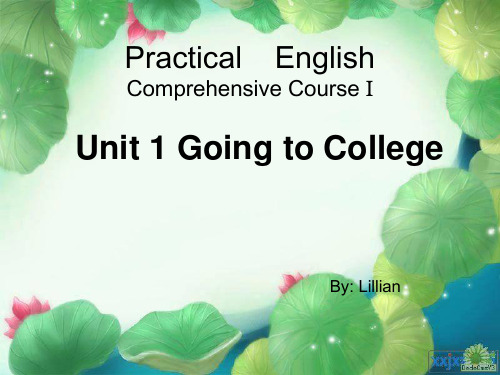
How to find the main idea of the whole passage?
• First paragraph • Last paragraph • Topic sentences • High-frequency words
Detailed reading
• Find out the topic sentence of each paragraph.
Practical English
Comprehensive Course I
Unit 1 Going to College
By: Lillian
Tasks of Text A
• Related information • Pre-reading task • Skimming: to get the general idea • Detailed reading: topic sentences and
love having Fridays off.
Language points
I’m away from home, so I have many things to adjust to.
• adjust to: to get used to by changing behavior or ideas
• Underline the new language points.
Topic sentences
• The topic sentence of para.1 College is a new and different experience for
me. • The topic sentence of para.2 Living at college, first of all, gives me a
实用大学英语第一册听力原文和课后习题与答案
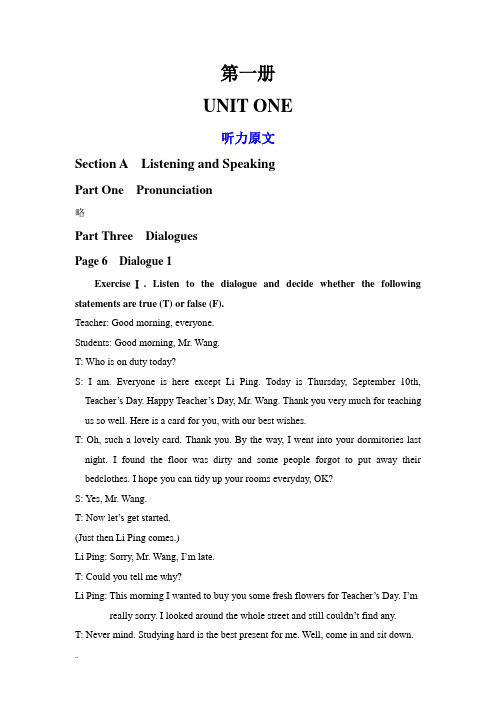
第一册UNIT ONE听力原文Section A Listening and SpeakingPart One Pronunciation略Part Three DialoguesPage 6 Dialogue 1ExerciseⅠ. Listen to the dialogue and decide whether the following statements are true (T) or false (F).Teacher: Good morning, everyone.Students: Good morning, Mr. Wang.T: Who is on duty today?S: I am. Everyone is here except Li Ping. Today is Thursday, September 10th, Teacher’s Day. Happy Teacher’s Day, Mr. Wang. Thank you very much for teaching us so well. Here is a card for you, with our best wishes.T: Oh, such a lovely card. Thank you. By the way, I went into your dormitories last night. I found the floor was dirty and some people forgot to put away their bedclothes. I hope you can tidy up your rooms everyday, OK?S: Yes, Mr. Wang.T: Now let’s get started.(Just then Li Ping comes.)Li Ping: Sorry, Mr. Wang, I’m late.T: Could you tell me why?Li Ping: This morning I wanted to buy you some fresh flowers for Teacher’s Day. I’m really sorry. I looked around the whole street and s till couldn’t find any.T: Never mind. Studying hard is the best present for me. Well, come in and sit down.Let’s begin our lessons.ExerciseⅡ. Listen to the dialogue again and fill in the blanks with the information you’ve heard.Page 7 Dialogue 2Exercise Ⅰ. Listen to the dialogue and complete the following statements with the information you’ve heard.Students: Mr. Wang, what is today’s ho mework?Teacher: For today’s homework, do the exercis es on Page 10.S: Shall we do them orally or write them in our exercise books?T: First write them down in your exercise books, then practice them orally until you have learned all of them by heart.S: It will take us a lot of time.T: I won’t ask you to hand in your exercise books until the day after tomorrow. Can you manage to recite them next week? I think you’ll have plenty of time.S: Well, we’ll try to finish the homework on time.T: OK. If you have any questions, come to my office tomorrow afternoon. I will be available from 1:30 to 5:00.S: Thank you very much.ExerciseⅡ. Listen to the dialogue again and answer the following questions. Part Four PassagesPage 8 Passage 1Now you’ll hear a passage. Listen to it and complete the following sentences according to the information you’ve heard with the words and phrases provided in the box. Then listen to it again and check your answers.A Way to Improve English Listening QuicklyFew days ago, I watched a video which was taken by certain member of Taiwan University for teaching students how to improve English listening skill. Some advice is given from the lecturer. The source of the information is the Writing Center website.Today, I try to watch English movie without Chinese translating subtitles. At the beginning, it is very difficult to understand what the actors are talking about. But gradually, I can figure out more and more words. I know that the method does work to improve my listening skill. Certainly! My English listening ability is not good enough. It is fun to learn things and I always believe that.Page 8 Passage 2Now you’ll hear a passage, which is followed by four questions. Listen to it and choose the best answer to each of the following questions. Then listen to it again and check your answers.Many Chinese students have studied English for more than ten years. However, when they meet a native speaker, they are still unable to speak English very well. They seem to have mastered the basic language structure, but a conversation in English will make them feel uncomfortable. They are afraid that other people might find out their mistakes.Many students who are bad speakers of English can write English perfectly. This proves that they are unable to think about their ideas in English. The center of the problem is that they lack practice and positive belief in themselves.Why should you be afraid? Do you fear those native speakers with whom you are speaking? Don’t be shy! They will not laugh at yo u just for a little mistake you make. The best way to get rid of mistakes is to learn to speak by speaking more. I am sure that continual practice will help you succeed.习题答案及参考译文Section A Listening and SpeakingPart One PronunciationⅠ. 清辅音: ☐ ♦ ♦♦ ♦❒ ♦☞ ♐ ♦ ☞ ♒浊辅音: ♌ ♎ ♑ ♎ ♎❒ ♎✞ ❖ ❆ ✞ ❒ ● ♦ ❍ ⏹ ☠Ⅱ. 略Part Three DialoguesDialogue 1Ⅰ. 1. T 2. F 3. TⅡ. 见听力原文Ⅲ. 略Dialogue 2Ⅰ. 见听力原文Ⅱ. 1. On Page 10.2. First write them down in their exercise books, then practice them orally.3. In the office.4. In the classroom.Part Four PassagesPassage 1见听力原文Passage 2Ⅰ. 1. B 2. B 3. D 4. AⅡ. 略Section B ReadingText A演讲例文:Hello, my dear friends and my wonderful teacher!I am very glad to say something here. My topic today is about our college life. Several months ago I was sitting in the classroom of my senior high school, struggling for my dream to be a college student. At that time, I knew I should and must go on with my school education in this autumn, for I want to be good, just good. I will be a true man in the future who can live on my own. I will be a true man who can do something for my mother and my motherland.When I came here, I found our college was not the same as the one in my imagination. But they are both good. I think I have adapted to my college life. And I can even say I have got accustomed to it.In order to succeed in the future, I have made careful plans. Firstly, I will work harder and try to master English and computer technology. Secondly, I hope I can work in the student union to get some practical experience. Thirdly, I will make new plans. That’s all. Thank you.参考译文:我的大学生活1 大学生活伊始,我发觉它与高中生活大不相同。
大学英语第一册第一单元
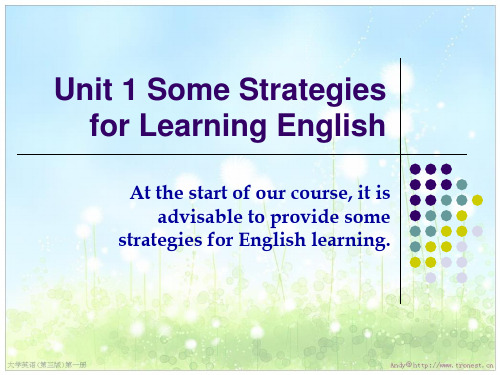
Useful Expressions
➢ Bound book
➢ 绵绵不断的雨
➢ Commit to flames
➢ 犯罪
➢ Have some acq. with
➢ 航线 ➢ 扩大会议
✓ 精装书
✓ Constant rain
✓ 付之一炬
✓ Commit a crime
✓ 略懂,略知
1. Useful Expressions 2. Text Interpretation 3. Word Family 4. Sentence Structure 5. Translation Practice 6. Reading Skill 7. Guided Writns
➢ 笔友 ➢ 文化差异 ➢ 总而言之 ➢ 文字处理 ➢ 资本积累 ➢ 专心/专注于
✓ Pen pal ✓ Cultural difference ✓ In summary/ To sum up ✓ Word processing ✓ Capital accumulation ✓ Be absorbed in
14. With each repetition you will get sth more. 15. Seize opportunities to speak. 16. It is true that … but you can seek out… 17. Apart from compositions assigned by your … 18. It pays to absorb as much as you can from
a time, some are bound to be crowded out. 8. What you need to do is to deal with words
实用英语第一册第一单元课件
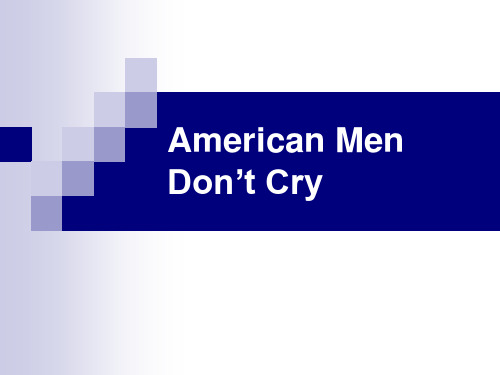
new words
Para. 2
Capacity n. ability, power 能力;容量,容积 e.g.
(1)He has a great capacity for remembering. (2)The theatre has a seating capacity of 2000.
Incapacity n. lack of ability or power to do sth. e.g. He was fired for his incapacity for hard work.
approve
disapprove: v. (of)
to have an unfavorable opinion 不赞成, 不同意 e.g.
(1) He disapproves of women smoking. (2) They disapproved strongly of my proposal.
Translation
因为哭是人体的一种自然技能,是为了让感情失衡 的人恢复到平衡状态。
translation
Para. 2
The return of the unbalanced organ systems of the body to steady or dynamic stability is known as homeostasis.
new words
Para. 1
in the least: (usu. in negative) at all 一点,丝毫,极少
e.g.
(1)He is not in the least worried. (2)He was not in the least surprised.
实用大学英语一1

Unit One
Section A Listening and Speaking ◆学习语音基础知识 ◆掌握Classroom English的相关表达 Section B Reading • ◆阅读两篇有关The College Life and Study的文章 • Section C Trying Your Hand • ◆了解词类,句子成分以及它们之间的关系 • ◆学习英语句子的种类和五种基本句型
[e] :前元音 嘴形扁平,舌尖抵下齿,舌 前部稍抬起
一、发音规则: [e] e ea
二、学单词 egg 鸡蛋 head 头
bell 铃铛 breakfast 早餐
bread 面包 sweater 毛衣
三、练句子 ①Egg,bread,I like them. 鸡蛋,面包,我喜欢他们。 ②I have eggs and bread for my breakfast. 我早餐吃鸡蛋和面包。
[ɔ:] :后元音双唇收得小而圆,并向前突出, 舌身往后缩。
一、发音规则: [ɔ:] al or oor aw our ore 二、学单词 ball 球 door 门
wall 墙 draw 画画 horse 马 four 四
三、练句子 ①A small ball is near the door. 一个小球在门边。 ②A big picture is on the wall. 一张大图在墙上。
三、练句子 ①A robot is crossing the road. 一个机器人正在过马路。 ②A goat is following the robot. 一只山羊跟在机器人后面。
[u:] :后元音嘴形小而圆,微微外突,舌 头尽量后缩。字母”U”[ju:]是由辅音[j]和元 音[u:]结合成的一个新的长元音,去掉[j]的 发音,你就会发[u:]音了。
新实用英语视听说教程第1册最新版教学课件内置音视频U1 (上)

C. She’s a salesperson. 2. Why doesn’t Lynn like her job?
A. The money isn’t good. B. She doesn’t like her boss.
✓C. She works long hours.
✓ A. France B. Canada C. The United States
4. Marie teaches .
✓ A. French B. business management C. English
5. Rick and Sachiko are studying .
✓ A. Mathematics B. English C. business management
to know? Paula: Of course ______ Ido.
Episode 2
Task 2 Watch the episode again and choose the best answer to each question.
1. What does Lynn do? A. She’s a hotel worker.
3. What does Lynn want to do?
✓ A. Work in a hotel.
B. Work for an airline. C. Work in a resta 3 Watch the episode again and decide whether the following statements are True or False.
Episode 3
So that opens up the doors of conversation. While you are at the dinner party you have a responsibility to several guests. That is going to include the person directly in front of you and the person to your right and the person to your left. If it’s a small table of six then you could actually interact with everyone. A very large banquet table then you had better only being responsible to interacting with the person across from you and the person on either side of you. Your responsibility is to add value to the meal with interesting and inter-lectural conversation. So, when I am looking at this person I want to be very interested in indicating that with my body and language. I am going to nod at them and say “fascinating and tell me more”. When I was in Italy last year, I experienced something similar. How did you end up handling that situation? Now I am speaking to this person. However, we have other guests as well. So I might catch up someone else’s eyes and say they are very interested. And then I say “John I see that you like to add some comments to the Italy experience”. Then that would include them as well. So, it’s looking, nodding of the head. “Fascinating. Tell me more.”
新大学英语第一册01

Key Words And Expressions
diligence: steady effort; the quality of showing care and effort in what one does diligent a. study with diligence 勤奋学习 Here I‟m going to talk about some other virtues: diligence, patience, and humility. He is diligent in his studies.
Key Words And Expressions
ቤተ መጻሕፍቲ ባይዱ
at fault: guilty of error; deserving blame, responsible for something bad that has happened The police said that the driver was at fault. As for air pollution, most people believe that steel factories are at fault.
Key Words And Expressions strategy: the art of planning and managing operations over a long period. strategy and tactics 战略与战术 strategy management strategy of trading space for time 用空间换取时间的战略 I know his conception of political strategy.
全新版大学英语综合教程第一册课件(完整版)

新版大学英语综合教程第一册 Unit1PPT课件
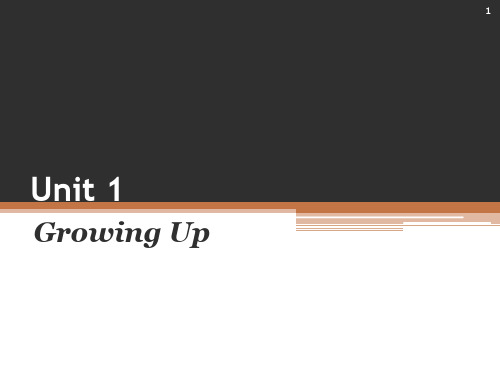
12
Further Questions: Part One
8
Global Reading
• Scan the Text and find out all the time words, phrases and clauses.
• Match the heading with each paragraphs
• Part Division of the Text • Further Questions
• “A hard row to hoe” is used in the song to describe growing up daisfficaul_t _____ process.
• Sadly John Lennon n_e_v_e_r_d_id__li_v_e to see his son grow up; Lennon was killed by a mad man when his son was stifilvel yoeanrlsyo_l_d_______ .
when Mr. Fleagle finished (Para. 9)
10
Global Reading
• Baker’s feeling about English courses • What Baker discovered • Mr. Fleagle’s announcement • Classmates’ response to the essay • Baker’s impression of his new English
创新实用英语第一册 Level 1 Unit 1(version3.0)

Unit One Communication
创 新 实 用 英 语
Level 1 Unit 1
I. Learning Focus
II. Cultural Background or Related Information III. Video Clip IV. Course Presentation
Warming-up 1
1. Forms of Communication Task 2 Discuss the following question with a partner. Which form of communication do you like best, and why?
SAMPLE ANSWERS I like email best because it is fast, easy to use, and costs almost nothing. It is also “green” and environmentally friendly.
创 新 实 用 英 语
Level 1 Unit 1
Part I
Warming-up
Part II Listening & Speaking
Part III Reading Part IV Grammar Focus Part V Practical Writing Part VI Translation Focus Part VII Reading for Fun 创 新 实 用 英 语
Grammar Focus
Practical Writing
良好的沟通就如黑咖啡般令人振奋刺激,也同样令人过后 很难入睡。 ——安妮· 莫罗· 林德伯格
实用英语综合教程第一册第一单元
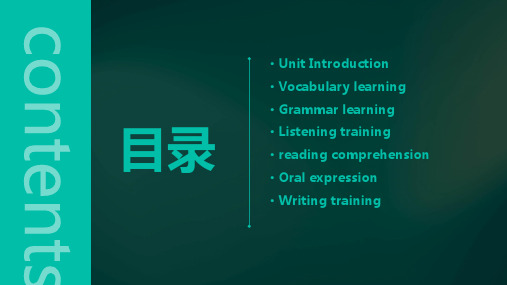
05 reading comprehension
Reading materials
选择合适的阅读材料
选择适合学习者水平的文章,可以是新闻报道、短篇小说、 科普文章等。确保文章内容有趣、相关,能够吸引读者的 注意力。
材料的难度
根据学习者的实际英语水平,选择难度适中的阅读材料。 难度过高的文章可能会使学习者感到挫败,而过于简单的 文章则可能无法提供足够的挑战。
01 Unit Introduction
Unit objectives
Language Skills
To improve English language skills, including reading, writing, speaking, and listening.
Communication Skills
02 Vocabulary learningΒιβλιοθήκη New vocabulary
01 02
Listening practice
The student should listen to the audio recording of the new vocabulary and repeat after the speaker. This helps to improve pronunciation and listening comprehension.
Matching
The student should match the correct vocabulary words with their corresponding meanings or synonyms/antonyms.
Vocabulary extension
实用大学英语综合教程1Unit 1 College Life
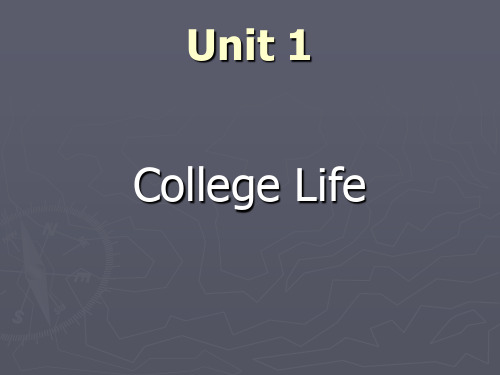
► Para
5 ► fall short ► 缺乏; 不足; 达不到(目标); 不符合 ► We still fall far short of what the Party expects of us.
我们离党的要求还差得远。
► Pick
your battles: ► People use the term “pick your battles” to suggest that people would be well-advised to select a specific issue of importance to focus on, rather than trying to deal with too many things at once.
2. What would you like to do at college?
► 2.
Students may want to make more friends, master more knowledge, enrich their life experiences etc.
3. Have you set your goals in college? If yes, what are they?
1. What’s your purpose of going to college?
► 1.
The purpose of going to college may include the following, including: ► to learn more knowledge, ► to make it more likely to find a decent job, ► to get a good start in life, ► to contribute more to the society, ► to fully develop oneself…
实用大学英语Unit1Section B
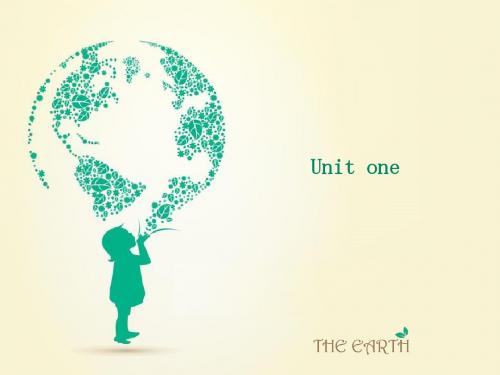
adapt
vt.适应;改编,改写
surrounding n.环境 mature adj. 成熟的 vt. 使成熟 vi. 成熟
comfortable adj.舒适的 widen vtich vt.使富裕,使充实 addition n.加法;补充;添加物 apply vi.申请 accumulate vt. 积累
4.Dou you think you have adapted to the new life here? 5.Do you have any plans for the future college life?What ara they?
New Words
various adj.各种各样的
campus n.(大学或学院的)校园 arouse vt.唤醒:引起,激发 enthusiasm n.热情;热衷的事物 benefit vi. 得益,受益 vt.使受益
Our school library is a good place for students to study(5),the reading room quiet and (6).The books there really help me a lot.Not only does reading widen my knowledge,but it also(7) my life.
Unit One
Text A
Questions
1.Why did you choose to go to college?
2.Is the college life the same as what youimagined before?
3.How do you like your campus?
- 1、下载文档前请自行甄别文档内容的完整性,平台不提供额外的编辑、内容补充、找答案等附加服务。
- 2、"仅部分预览"的文档,不可在线预览部分如存在完整性等问题,可反馈申请退款(可完整预览的文档不适用该条件!)。
- 3、如文档侵犯您的权益,请联系客服反馈,我们会尽快为您处理(人工客服工作时间:9:00-18:30)。
Unit one Families
Read and Explore
Passage A
1、What types of family do we have now ?
2、What role do you think the family plays in a person’s life?
3、In what way do you think the family members can live together happily?
Families
The word “family”has different meanings for different people. Some people think of a family as a mother, a father, and their children; others think a family should include grandparents, aunts, uncles, and cousins. For some of us, family means the group of relatives living far away from home. For others, having a family simply means having children. No matter if it is young or old, large or small, traditional or mordent, every family has a sense of what a family is. It is that feelings of belonging, of love and security that comes from living together, helping and sharing.
There are basically two types of families: nuclear families and extended families. The nuclear family usually consists of two parents and their children. The mother and father form the nucleus, or center of the nuclear family. The children often stay in the nuclear family until they grow up and marry.
The extended family is very large. There are often many nuclear families in one extended family. An extended family includes children, parents, grandparents, uncles, aunts and cousins. The members of an extended family are related by blood or by marriage.
Traditionally, all the members of an extended family lived in the same area. However, with the change from an agricultural to an industrial society, many nuclear families moved away from the family home in order to find work. In industrial societies today, the members of most nuclear families live together. Therefore we can say that the nuclear family becomes more important than the extended family as society industrializes.
In post-industrial societies, even the nuclear family is changing. The nuclear family is becoming smaller as parents want fewer children, and the number of childless families is increasing. What’s more, many nuclear families are also “splitting up”—more and more parents are getting divorced.
What will be the result of this “splitting”of the nuclear family? Social scientists now talk of two new family forms: the single parent family and the remarried family. As social scientists study these two new family forms, they will be able to tell us more about the future of the nuclear family in the post-industrial age.
(359words)。
